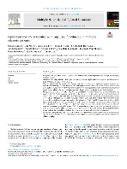Lipid measures are associated with cognitive functioning in multiple sclerosis patients

Autor
Hrych, Daniel
Urban, Tadeáš
Kober, Tobias
Marechal, Benedicte
Datum vydání
2024Publikováno v
Multiple Sclerosis and Related DisordersNakladatel / Místo vydání
ElsevierRočník / Číslo vydání
91 (November)ISBN / ISSN
ISSN: 2211-0348ISBN / ISSN
eISSN: 2211-0356Informace o financování
MZ0//NU22-04-00193
FN//RVO-VFN64165
UK//COOP
MSM//LX22NPO5107
Metadata
Zobrazit celý záznamKolekce
Tato publikace má vydavatelskou verzi s DOI 10.1016/j.msard.2024.105879
Abstrakt
Background: An association between lipid measures and cognitive decline in patients with multiple sclerosis (MS) has been suggested. Objectives: This study aimed to investigate relationships between lipid profile and cognitive performance in a large observational cohort of MS patients. Materials and methods: We included 211 patients with 316 available pairs of lipid and cognitive measures performed over follow-up. The time between lipid and cognitive measures did not exceed 90 days. Baseline data were analyzed by non-parametric Spearman rank correlation test. Repeated measures were analyzed using linear mixed models adjusted for sex, age, education level, disease-modifying therapy status, and depression. Results: Baseline analyses showed a correlation between higher low-density lipoprotein cholesterol (LDL-C) and lower Categorical Verbal Learning Test (CVLT) (rho=-0.15; p = 0.04), lower Symbol Digit Modalities Test (SDMT) (rho=-0.16; p = 0.02) and lower Brief Visuospatial Memory Test-Revised (BVMT-R) scores (rho=-0.12; p = 0.04). Higher high-density lipoprotein cholesterol (HDL-C) was negatively correlated with lower SDMT scores (rho=-0.16; p = 0.02) and lower Paced Auditory Serial Addition Test-3 (PASAT-3) scores (rho=-0.24; p = 0.03). Mixed model analyses of repeated measures showed a negative association between higher LDL-C and lower CVLT (B=-0.02; p < 0.001, Cohen<acute accent>s d = 0.08) and lower BVMT-R (B=-0.01; p = 0.03, Cohen<acute accent>s d=-0.12). Also, the negative association between HDL-C and PASAT-3 was confirmed in the mixed model analysis (B=-0.18; p = 0.01, Cohen<acute accent>s d = 0.07). Additional adjustments of the models for disability assessed by Expanded Disability Status Scale or Normalized Brain Volume did not change the results of the models substantially. Conclusions: Our results suggest a mild negative impact of dyslipidemia on cognitive performance in patients with MS. We propose that dyslipidemia contributes, at least in part, to cognitive decline in MS patients, independent of brain atrophy.
Klíčová slova
LDL, HDL, Cognition, Multiple sclerosis,
Trvalý odkaz
https://hdl.handle.net/20.500.14178/2691Licence
Licence pro užití plného textu výsledku: Creative Commons Uveďte původ 4.0 International







